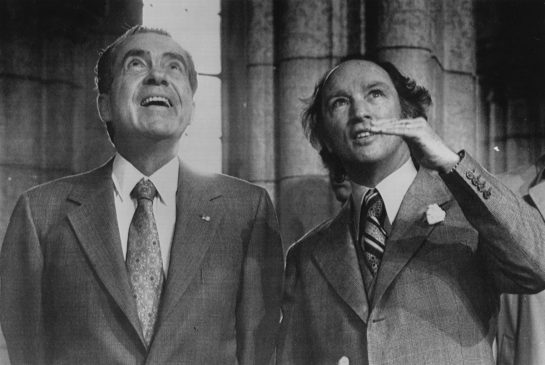The release of the last tranche of tape recordings from the Nixon-era White House turns up an effusive Pierre Elliott Trudeau calling the beleaguered U.S. president to assure him this “Watergate thing” will blow over.
“I wanted to phone you to tell you how distressed I was about all this noise that is going on around the Watergate thing,” Mr. Trudeau says in the May 11, 1973, recording.
“I’ll tell you that, as far as I’m concerned, the people here … and certainly myself have great confidence and respect, and among politicians, we realize how, how, how initial actions can be seized upon and distorted.”
Mr. Nixon replies, “I’ll tell ya, we’ll survive it, Mr. Prime Minister … but your call, I will always remember.”
The Trudeau-Nixon exchange is part of the 3,000 hours of tapes the U.S. president recorded secretly between February 1971 and July 1973. They were released by the National Archives & Records Administration Wednesday.
Their conversation came amid a growing scandal about the 1972 break-in at the Democratic National Committee’s offices in Washington’s Watergate Hotel.
Mr. Trudeau, of course, was wrong. The affair did not blow over and Mr. Nixon was forced to resign, the only U.S. president to do so.
He faced being removed from office by Congress for trying to hinder the government’s probe of the Watergate break-in. Many of his top White House and political aides were prosecuted.
Despite their seeming chumminess, the two leaders did not get on. An earlier recording, released in 2008, has Mr. Nixon calling Mr. Trudeau an “asshole” and “a pompous idiot.”
Another tape features the U.S. president discussing, with his trademark profanity, how to deal with Mr. Trudeau before a chat on Dec. 6, 1971.
“I got the note, John, on what to say to this son of a bitch Trudeau,” he says to his treasury secretary, John Connally.
“Where do you want me to lead Trudeau? I don’t know where to lead him,” Mr. Nixon tells Mr. Connally.
The tapes cover the period between April 9 to July 12, 1973, the day before the existence of the covert recording system was revealed to a Senate committee investigating Watergate.
Although the final instalment describes the tumultuous three months of the Nixon presidency, the tapes also show him at work seeking to further relations with Soviet Russia and China.
Among the exchanges recorded is a surprisingly friendly meeting with Leonid Brezhnev, the Soviet Union leader, who revealed his strategy for cutting down on smoking.
“You see, I have a cigarette box there. It has a special timing mechanism and I can’t — I won’t be able to open it for an hour,” says Mr. Brezhnev
“Oh, how’s it open?,” replies Mr. Nixon.
“See, the mechanism, the timing mechanism is now working and I won’t be able to open that for another hour. In one hour it will unlock itself.”
“That’s a way to discipline yourself,” says Mr. Nixon, laughing.
Later. Mr. Brezhnev explains in great detail why his wife, son and grandson were not able to attend the summit, lest the U.S. president should detect any hint of a snub in their failure to attend.
“I also wanted to bring my son along, but then he has his own kid. Now, the trouble is that his my grandson, his son that is, is finishing his high school this year,” says Mr. Brezhnev.
“He’s got his examinations, his graduation examination, and then his entrance examination to Moscow University. And so you know how parents are,” he adds, telling how his son would “pacing the corridors” waiting for his grandson to finish.
Another of Mr. Nixon’s foreign policy achievements was to open diplomatic relations with Mao Zedong’s China, which he visited in 1972, the first U.S. president to do so.
On the tapes Mr. Nixon can be heard telling David Bruce, his new ambassador in Beijing, “I look upon the Chinese-American relationship as really the key to peace in the world.”
In a conversation on May 3, 1973, he told Mr. Bruce to do his best to socialize with China’s ruling elite to ascertain who was likely to become the next generation of leaders after Mao and then communicate his findings via a “back channel”.
“There’s parts of these games that we don’t want to go to the bureaucracy,” says Mr. Nixon to Mr. Bruce, who agrees security at the U.S. State Department is “non-existent” and agrees to use the back channel.
“I want you to feel that you are basically, not the State Department’s ambassador, you are the President’s,” Mr. Nixon adds.
Other conversations which will now be pored over by historians include those between Mr. Nixon and Henry Kissinger, his secretary of state, three future presidents, and celebrities Billy Graham, as well as a rather stilted encounter with the Brazilian soccer superstar Pele.
National Post, avec des dépêches de Associated Press et du quotidien The Daily Telegraph
Pierre Trudeau phoned Nixon to to tell him he was ‘distressed about all this noise’ over Watergate
Araminta Wordsworth



























Laissez un commentaire Votre adresse courriel ne sera pas publiée.
Veuillez vous connecter afin de laisser un commentaire.
Aucun commentaire trouvé